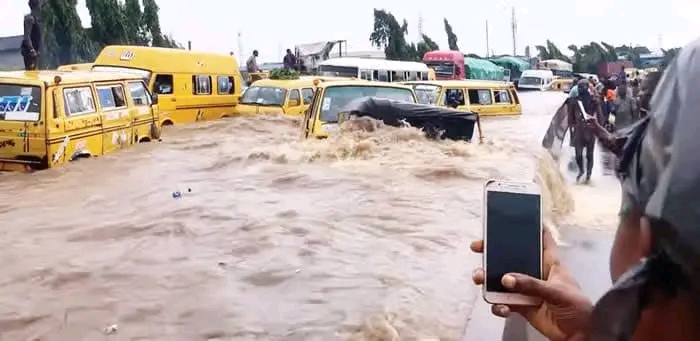![]()
The Lagos State Government has issued a fresh warning to residents, especially those living in low-lying and flood-prone areas, to brace for possible flash floods following the intense rainfall experienced across the state on Saturday, June 14.
The alert was contained in a statement signed by the Commissioner for the Environment and Water Resources, Tokunbo Wahab.
According to the statement, meteorological forecasts from the state’s weather stations indicate thunderstorms and widespread convective rainfall, with dense cloud cover suggesting continued downpours.
The release, noted that Lagos, being a coastal city, is especially vulnerable to flash floods, which may come with strong currents and rising lagoon water levels.
Explaining the implications of the forecast, Wahab stated, “The geostationary imagery we received clearly shows that several areas in Lagos will experience very heavy rainfall and flash floods. This is not unexpected, and we have been warning about it since earlier in the year.”
He urged residents in vulnerable areas particularly those near rivers and lagoons to be extra vigilant and consider staying indoors during the peak of the rain.
“If you do not have any urgent reason to be out in the storm, we advise you to wait it out,” he said.
“It’s safer to assess the intensity of the rain before stepping out so you can prepare adequately.”
The Commissioner specifically appealed to parents to keep a close watch on their children, many of whom are currently on mid-term break, stressing that, “Children must not be allowed to play in the rain or swim in floodwaters. It is dangerous.”
Motorists and pedestrians were also advised not to attempt driving or walking through floodwaters. “Vehicles can be submerged in seconds, and people swept away with the floods,” Wahab warned.
Highlighting the topographical challenges of Lagos, he said, “Due to the coastal nature of our state, tidal lock situations are common during heavy rainfall. This prevents water from draining properly through our collectors, especially when the lagoon’s water level rises.”
Wahab further reminded residents not to dispose of waste into drains, noting that clogged drainage channels are a key cause of urban flooding. “There are consequences for dumping refuse into drains. Such acts block free flow of water and worsen flood situations,” he cautioned.
He assured the public that all drainage channels in the state are under continuous maintenance. “We clean and maintain the drains year-round, but when rainfall exceeds normal patterns, everyone’s cooperation is essential to mitigate the effects,” he added.

























